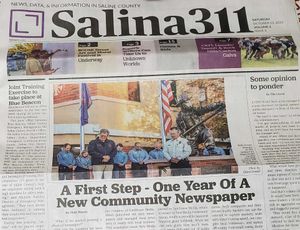By Matt Moody
"What if we started printing a physical newspaper?"
This was the question we were pondering one year ago. At the time, it seemed like a preposterous idea. As we all know, newspapers have been decimated over the past two decades. They've reduced the number of days they print, slashed their staff, and the stories they actually print are nearly all from a generic national news feed. The following questions we discussed were, "if all the newspapers are dying, why are all these private equity firms buying local newspapers? Why is SoftBank buying local newspapers if they're all dying?"
In August 2019, New Media Investment Group acquired USA Today-owner Gannett Co for $1.4 billion. New Media was the parent company of GateHouse Media, which published 144 daily newspapers and managed local news sites in nearly 600 local markets. This acquisition made New Media Investment Group the country's most prominent local news entity, dwarfing the 28 major newspapers owned by William Randolph Hearst back in the heyday of newspapers.
While consolidation is standard in a stagnant/declining market, much more is happening here, and the implications create serious risks for local markets like Salina.
Private equity is well known for stripping businesses down to the bones and extracting profits. In this case, that is precisely what is happening.
According to Kansas law, public notices must be printed in the local "paper of record ." In Salina, this is the Salina Journal, which is owned by Gatehouse Media, which is owned by New Media Investment Group, which is owned by Japanese financial giant SoftBank. While we can only guess how much money is being siphoned out of Salina into the hands of private equity, we can rest assured that this money is not going to stay in Salina. It's gone and unlikely to ever return. When a business can corner a regulated and mandated market, they have a cash cow, and it doesn't matter how poorly they treat their customers. Since they have aggregated much of the news around the country, they can strip down the staffing in each market to nothing and continue extracting revenue from public notices and what's left of local ad dollars.
While the internet has been a positive influence in many ways, it lends itself to winner-takes-all scenarios. Tech companies and their private equity backers can use the internet to capture markets, scale with mind-blowing speed, out-compete local businesses, and siphon off money from small towns, thereby reducing them to shadows of what they were in the past.
Is it any wonder why trust in media is at or near an all-time low? The information produced is being produced by a powerful few, and the perspectives of those powerful few are now being thrust upon everyone. This isn't just risky; it is dangerous for complex systems like societies.
After learning about what lies behind the curtain, we answered the preposterous question with, "let's give it a shot." It felt like a good fight to take on and potentially positively impact Salina.
While I wish I could say it all went smoothly, we have a lot of work left to do. None of us had any background in print, and we didn't know what we didn't know. We had to learn about the logistics of delivery, the printing process, and how to try to cover a market the size of Salina with only a handful of staff members. We know things are going on that we have a responsibility to question, and thus far, we haven't lived up to it.
But today, we mark one year down. It is a process, and we're making progress. The most critical aspect of creating something meaningful is ensuring it's sustainable. While many local news organizations have gone the non-profit route, we don't see "begging for dollars" as sustainable. Eventually, these types of organizations will run out of steam because the incentives aren't all aligned. Most importantly, we know that people will respond if we make something truly interesting.
Suppose Salina has a locally-owned, profitable newspaper. In that case, it has the potential to positively impact the perspectives of those who live here and to ensure that local authorities have checks and balances.
As we sustainably build this brick-by-brick, we will have more coverage of local government issues. We will have more staff to shine a light on things that just don't seem right. We will also make sure to shine a light on all of the great things that are happening. As part of building a new newspaper, we believe the days of "if it bleeds, it leads" are over. More good things are happening in Salina than bad, and it's far past time to put those good things on a pedestal.
We want to thank you all for supporting us in this process. We also want to thank the local investors who are backing Salina311 and the local journalists who have provided feedback along the way. Special thanks to Tim Unruh, Tom Bell, and Tom Wilbur.
As always, please send us feedback. Beat us up when we miss things and when we just aren't doing good enough. If we don't have your feedback, then we won't improve.
Finally, if you're interested in joining us to cover Salina news full-time, part-time, or even occasionally, please reach out. matt@salina311.com



